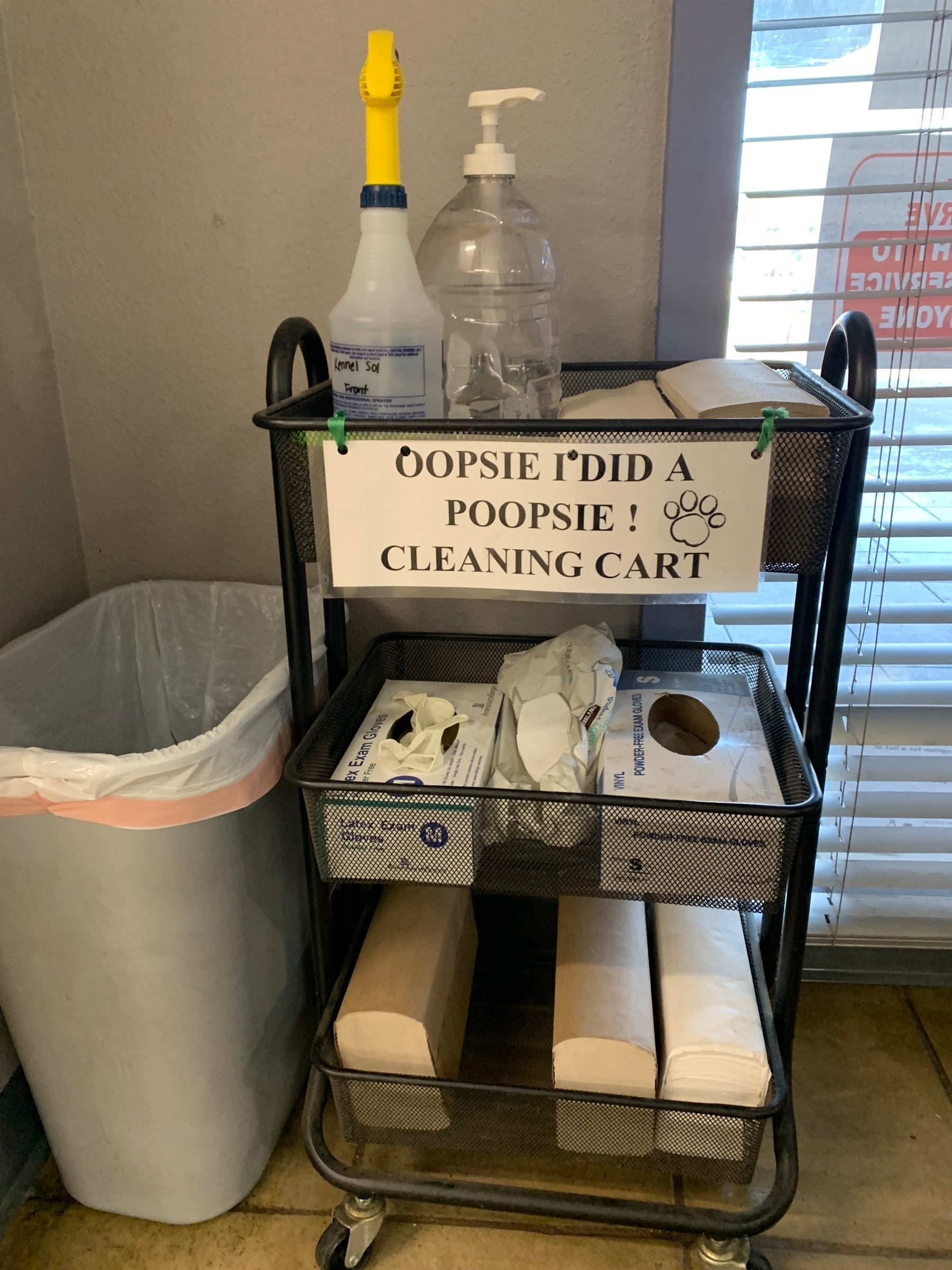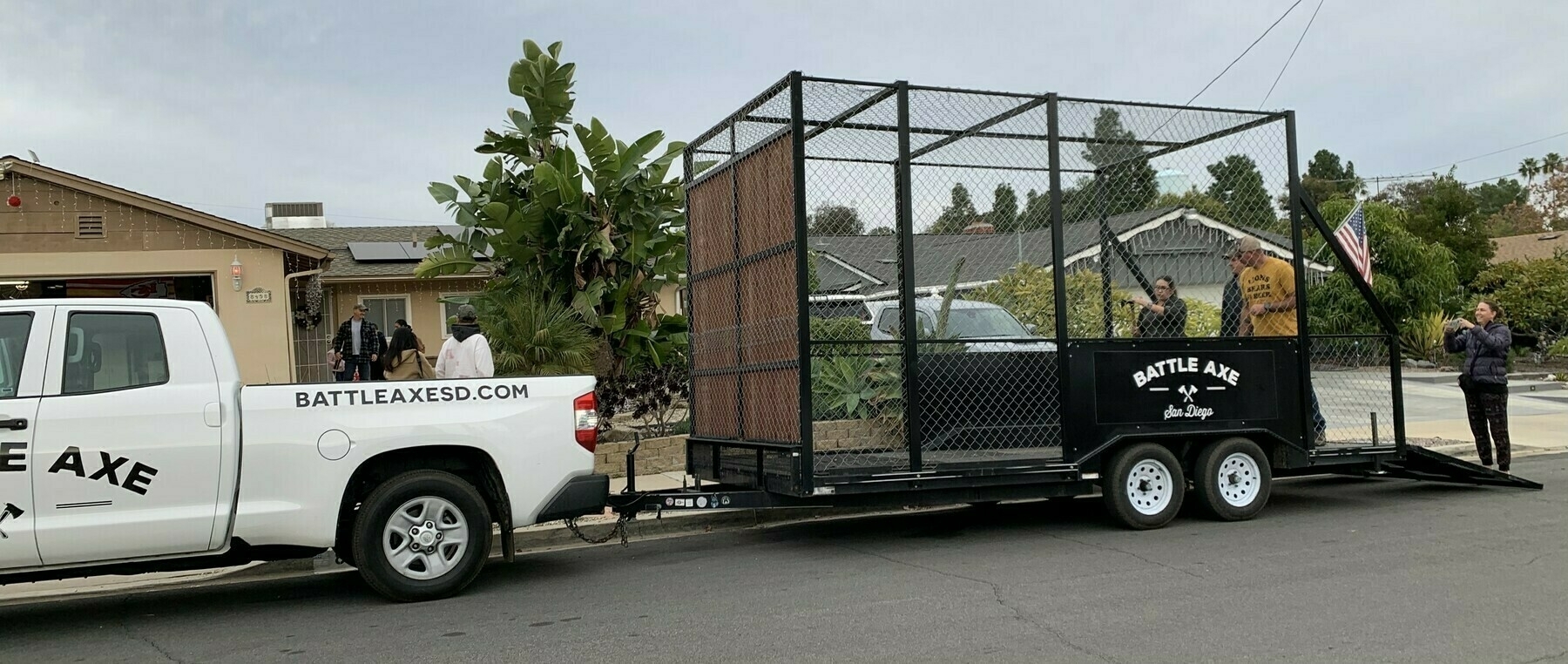Elon Musk was never a liberal, and his plans for Twitter were never benevolent. “Tech barons’ lip-service to democracy and pluralism was always conditional on preserving their own positions at the top.” By Thomas Zimmer at The Guardian.
“Karens for Hire”—slogan, “We Karen so you don’t have to”—promises “to harness the power of accomplished complainers in the service of beaten-down customers, abused tenants and anyone else with a dispute that outstripped their own capacity to carp.”
Cutting through customer service doom-loops by calling in a ‘Karen’
Steve Hendrix writes this for The Washington Post as a lighthearted story about a plucky startup seeing a problem and fixing it. Doing well by doing good. American entrepreneurial spirit at its finest.
But this is also a story about American society being fundamentally broken.
The Real History Behind ‘The Woman King’ | The Agojie Warriors of Dahomey. By Meilan Solly at Smithsonian Magazine.
The movie’s depiction of the Agojie army of elite women warriors is true-to-life. But Dahomey in real life was a brutal, imperial autocracy and enthusiastic supporter of slavery and the slave trade.
We liked the movie—much better than “Black Panther,” which I thought had too much superhero folderol. “The Woman King” was about 30-45 minutes too long, but most movies today are.
A secularised Jewish American thinks about celebrating Christmas. As a secularized Jewish American, I relate.
Ben Werdmuller: Christmas, the eighth night, and me.
I’ve had essentially no personal encounters with anti-Semitism in my own life—that I’m aware of.
Matt Stoller: Private Equity Gave Your Bank Password to Hackers
Francisco Partners and Evergreen Coast Capital Corp own LastPass. They raised prices, and then fumbled security. You had one job guys!
…
At this point, it’s time to recognize that ownership and management of software firms by private equity is itself a security risk.
Busloads of migrants dropped off at vice president’s DC home on Christmas Eve
The Bible literally says not to do shit like this. Matthew 25:31 and following.
Feline Navidad!

In rural Georgia, an unlikely rebel against Trumpism. By Stephanie McCrummen at the Washington Post.
Johnson, a 33-year-old white electrician with no college degree from rural Georgia, rejects hate.
I can’t decide whether I think this is a great profile, or whether it’s patronizing and elitist.
Fleece knobby dog, friends!

We watched the first episode of the first season of “Yellowstone.” We liked it. It’s like “Succession.”
There should be a Yellowstone/Succession crossover.
And it should have Doctor Who, too. Because everything is better with the Doctor.
I migrated my mastodon account to micro.blog but decided I don’t like micro.blog as a mastodon client because micro.blog doesn’t show boosts and I like seeing boosts. So I figured fine I’ll just use my mastodon account to read, and continue posting to micro.blog. But then I found that when you migrate a mastodon account the old account is disabled. So I re-enabled it and now I’ll just go back to what I was doing before and syndicate my micro.blog posts to mastodon.
Except now all my old mastodon followers are following me on micro.blog, which is what I wanted but maybe not what they want? But what’s done is done.
For my next trick, I will saw a person in half. Can I get a volunteer from the audience?
I’m going to use “Bomb Cyclone” as my porn star name.
While walking, the dog and I saw this tree. This is Christmas in a subtropical, semi-arid area.

From my journal, this day in 2013:
We still haven’t seen the two female cats we had that since we uncrated them yesterday, other than Julie seeing the shadow of ears when she looked under the bed. But during the night I heard meowing and felt little feet walking on me in bed. I assume that was the cats;Julie has never gone in for that kind of thing before.
We still have the cats. They are fully visible now.
I just migrated my mastodon.social account to micro.blog—which had the side effect of deactivating my mastodon.social account. I’m not sure I like that.
All of this is experimentation. The fediverse is in early days. We’re still figuring it out, collectively and individually.
I don’t think I am the target audience for Andor. Unless you’re supposed to fall asleep halfway through the fourth episode and then your wife wakes you up to let you know the credits are on and it’s time to turn off the TV. If that’s what Andor was going for, they nailed it.
A house down the street has a Santa hologram in the living room window, which I’ve never seen anywhere before. Either that or a creepy guy in a very realistic Santa costume.
We took one of the cats to the vet today.

What Happens When a Group of 12-Year-Olds Is Left with No Supervision for Five Days?
Jason Kottke: “After a brief attempt at cleaning, the boys completely trash their house, eat mostly sugar, divide into factions, and somehow trash the house even more.”
Who are the most influential and important people in history?
Jesus, Mohammed, the Buddha, Genghis Khan, Augustus Caesar, and Napoleon are 1-6, in that order.
Who else is in the top 12?
People who wear short pants and long sleeve, heavy sweatshirts in chilly weather are monsters.
People who wear short pants and long sleeve, heavy sweatshirts in chilly weather are monsters.
“I can’t go here. It would be too easy for him to pick up if I go here.” — The dog, looking for a place to poop while we’re out walking.
"… the App Store’s financial success is the worst thing that’s happened to Apple this century. It’s a distraction at best, and a profound corruption at worst." — John Gruber @gruber@mastodon.social
Gruber raises a good point here. The App Store, and general locked-down nature of the iPhone, is Apple at its controlling worst. I should have a right to install whatever software I want on my iPhone, repair it or pay someone else to do so, and modify it however I like, or pay someone else to do so. The limits on my ability to control my phone should be the law and public safety. Apple should not be allowed to make the rules here.
And don’t accuse me of going full Elon here. A phone is not a social network.
Mastodon is getting popular enough that it’s going to start attracting litigation and regulation. — Amanda Hoover on Ars Technica
Why Would Anyone Use Another Centralized Social Media Service After This? — Mike Masnick at Techdirt @mmasnick@mastodon.social.
I’m asking myself the same question. I’m heavily active on Facebook but not looking to get involved in another proprietary social media service.
We don’t need a new global town square to replace Twitter. We already have one: The Web.
The web is the world’s town square.I t’s been right there along along, and Twitter, Facebook, YouTube, etc., are all just layers on top of that web.
Nobody owns the web. If somebody like Twitter or Facebook puts a fence around their part of the web, that fence is just two feet tall. You can easily climb over it. If you’re not doing that, it’s because you’re choosing not to.
Mastodon is a great service. It’s not that hard to use. If you can figure out Facebook, you can figure out Mastodon. Learning to drive is harder and most of the people complaining about Mastodon being hard to use can already drive.
Mastodon is part of the much larger “fediverse,” which includes other services, which are less popular than Mastodon.1 Services join the fediverse by supporting a protocol called “ActivityPub.” It’s all very much like the way different email services interconnect with each other, and you can message from your Gmail account to another person’s Microsoft Outlook account without any difficulty.2 Already, we see WordPress blogs can be part of the fediverse, and a small blogging service called micro.blog, which I use, communicates with Mastodon using ActivityPub.
Right now, we’re not seeing a fediverse boom—we’re seeing a Mastodon boom. That needs to change. For the good of the web town square, people need to embrace that they can choose a variety of services that can all talk with one another.3 Mastodon is just one of those services.
@manuelmoreale makes similar points.
-
And Mastodon itself is pretty unpopular, compared with Twitter, which is in turn unpopular compared with Facebook or YouTube.) ↩︎
-
For an even better comparison, imagine if WhatsApp and Apple Messages could talk with each other. They’re similar but not identical—you’d lose some features but mostly you could communicate just fine. ↩︎
-
Kind of like the way your can read a Substack newsletter in email or on the web, and likewise you can get email updates on WordPress blogs. ↩︎
I like that micro.blog doesn’t support likes or reblogs. On Facebook, Tumblr, and Mastodon, I’m trying to pay very little attention to my likes and reblogs without comment.
Likes and commentless reblogs are sometimes useful. Sometimes a friend I haven’t heard from in a while likes one of my posts, or somebody famous likes or reblogs something, both of which are good to know. But most days, likes and reblogs without comment are just noise.
I wish Facebook, and Mastodon would just give me a daily report on likes and reblogs that don’t have comments. I don’t need or want that information in realtime. Tumblr lets me set something like that up with filters, but it could be easier.
micro.blog’s intentional lack of support for likes and reblogs is just one way it’s different from Mastodon. Here’s a good article from @manton describing why micro.blog is not Mastodon, even though you can connect between micro.blog and Mastodon.
Hi, @manton! Feature request for micro.blog: Let me import my Mastodon follower list, which I can already do when switching Mastodon instances. Right now, I’m syndicating my micro.blog posts to my mastodon.social account. Importing my follower list would be even better.
Daring Fireball @gruber@mastodon.social: Quora is beta testing an AI chatbot.
Shouldn’t be that big a change for Quora, many of whose participants already fail the Voight-Kampff test.
Cory Doctorow @pluralistic@mamot.fr: How Apple could open its App Store without really opening its App Store.
Apple will be required to open the iPhone to competing app stores, according to reliable reports, which is a huge deal and runs completely counter to Apple’s iPhone strategy since 2007. But Apple could still pull a fast one, unless regulators are smart, says Cory.
Apple “fights for its users when doing so is good for its shareholders. But when something is good for Apple shareholders and bad for its customers, the shareholders win, every time.”
Hearing Wendell Pierce say “fuuuuuck” in an early scene of S3E1 of “Jack Ryan” makes me want to watch “The Wire” again.
While walking, the dog and I saw this mobile axe-throwing setup. Because is it really the holidays without axe-throwing?

While walking, the dog and I saw this dapper gentleman.

The right believes in absolute free speech for everyone they agree with.
Soon as I saw the headline cross Mastodon, I checked my twitter account. Still active. I feel snubbed.
Thursday Night Purge: Elon Musk’s Twitter Bans Tons Of High Profile Journalists — Mike Masnick at Techdirt.
“… it seems that whatever brakes or controls were in place at the new ‘free speech absolutist’ Twitter have really come off.”
How cable monopolists tricked conservatives into shooting themselves in the face – Cory Doctorow
“No matter how hard conservative culture-war cannon-fodder love big business, it will never love them back.”
While out walking the dog late this afternoon I saw a little four-year-old girl wearing a beautiful green Christmas dress with a red bow on it. She was getting out of the car with her Dad, coming home from daycare I guess.
This was the same little girl I’d seen one morning a week or two ago, getting into the same car with her Dad. That morning she was wearing an elf costume, and was delighted to show it off for me.
So today I said to her, “Don’t you look pretty!” The dog, meanwhile, wanted to say hello, so I took a step or two slowly toward the girl and her father, keeping an eye on the situation.
This time, the girl was not delighted. Her face slowly started to crumple, and she clutched for her Dad’s leg and started to wail. So I backed away.
I don’t think she was afraid. I think she had just had a busy day, with a lot of stimuli and was overwhelmed.
“Kid,” I wanted to say. “A lot of the time I feel just like that.”
Years ago, two friends of mine, one at the CIA, one at the Pentagon, advised me to delete the app. So I don’t want to position the concerns about TikTok as an extreme position. Having a Chinese-owned social media app embedding itself into our lives is not without risk. But it’s worth noting that the things we fear from Chinese software companies—privacy invasions, data selling, democracy disruptions—are things that American social media companies have been doing with our full cooperation. It’s also worth noting that American social media companies have a particular interest in reducing competition from global players, and they’ve never faced this kind of a domestic business threat from a China-based company. In other words, the pressure to ban this outside app could be coming from inside players.
— Dave Pell, NextDraft, Tok Bottom
… a conservative is someone who believes that some of us were born to rule, and the rest of us were born to be ruled over.
— Cory Doctorow, @pluralistic@mamot.fr Plato Would Ban Ad-Blockers. He was a dick.
The idea that “if you’re not paying for the product, you’re the product” is utter nonsense. The factor that determines whether a company will treat you like the product is whether they can get away with treating you like the product. A company that is disciplined by neither competition nor regulation will extract value from you in every way it can get away with.
— Cory Doctorow, Plato Would Ban Ad-Blockers. He was a dick.
I have just disabled micro.blog’s cross-posting to my main mastodon account, and will instead use micro.blog’s native ActivityPub support. If you want to follow me on Mastodon, you can do so on @mitchw@micro.blog.
This situation is permanent. Until I change my mind. Which could be never. And could be in, like, an hour.
But if you follow me on mastodon, you should probably do it on @mitchw@micro.blog. One reason to do that is that the posts are formatted a little nicer that way.
micro.blog doesn’t show me who’s following me, who likes my posts, and who boosts them. I don’t even get numbers for those statistics. Doing without this information will be character-building for me.
I can’t make up my mind whether I want to cross-post from micro.blog to my primary mastodon account—as I am doing now—or simply use micro.blog’s built-in ActivityPub support. I go back and forth.
When I’m not cross-posting, I boost my micro.blog posts to my mastodon account manually, which maybe sounds like a hassle but it’s actually no big deal
I also can’t decide whether to redirect mitchw.blog to micro.blog.
This back-and-forth is pretty typical for me with regard to blogging and social media. I seem to like fiddling with my setup as much as I like posting.
Crypto Was Always Smoke and Mirrors: The fall of FTX shocked everyone. Except this guy.
The world of cryptocurrency is rich with eccentric characters and anonymous Twitter personalities. So perhaps it shouldn’t be a surprise that one of the early figures who called attention to the problems with Sam Bankman-Fried’s cryptocurrency exchange, FTX, is a 30-year-old Michigan psychiatrist who investigates financial crimes as a hobby.
He’s James Block, and he runs a crypto newsletter called Dirty Bubble Media.
Block, a vehement crypto skeptic, has spent the past 18 months doing forensic blockchain research. He uses open-source tools to follow flows of money between crypto companies, repeatedly demonstrating how shadow banks and nefarious scammers inflate the value of worthless assets in order to generate enormous wealth that exists only on paper.
Charlie Warzel interviewed Block for The Atlantic.
Block: The AMC-meme-stock thing is a good example of how this can happen. People buy the stock of a semi-worthless company because they have this idea about short squeezing, or whatever. They are not financial experts and have a loose or maybe even wrong understanding of how finance works, and want to try to move the market. Crypto takes this abstraction a step further, because there’s nothing linked to it at all. There’s no economic activity in this space. There’s nothing produced by these companies. In fact, it’s a negative-sum game because of the cost of running the blockchains alone—the computational cost is tremendous. The amount of time and money people put into just running these things is tremendous. And they produce nothing of value. There’s a reason these massive companies aren’t all using blockchain for their processes: It is incredibly inefficient. And realistically, who actually wants their financial information public and visible to everybody?
…
Warzel: Do you think most entities in the crypto space are insolvent and know it, and are just pretending right now, post-FTX?
Block: Absolutely. That’s because of what I said earlier about crypto. There’s no value created by any of these companies. It’s all just moving money from Person A to Person B.
Support Railroad Workers Fighting for Humane Conditions and Paid Sick Leave.
The RR workers get NO sick leave and NO regular schedules! They are always under their bosses’ thumb. COVID shows how important sick leave is. Inhumane schedules, and denying sick leave, especially during a pandemic, increases illness, deaths, and disparities, especially among people already vulnerable to Covid.
Sick leave and humane scheduling will not ruin the companies financially. Paid sick leave only amounts to 3.5% of the industry’s soaring profits; in fact, over 50% of their revenue is profit.
— People’s CDC
American healthcare is split into 2 piles:
- Face holes
- Not face holes
— US Healthcare, by Matt Haughey on A Whole Lotta Nothing
h/t kottke.org
Speaking as a former comedian, it’ll be interesting to see how this plays out. Because … have you ever had 10,000 people hate you TO YOUR FACE before? Because I have. And humans aren’t wired for that.
I’d note that the 10,000 people hating me to my face were actually just stonily silent while I ate it on stage while opening for a musical act. And while I laughed it off after .. it was rough. And I’d been working for years at that point. But BOOING?!
And for a *narcissist*? Just saying – expect some serious whiplash crazy coming over the next week.
— John Rogers @jonrog1
h/t jwz
jwz: “I would like to report an absolutely absurd use of metaphor.”
Truck fire leads to huge pile of trash dumped in front of police station.
If you walked by 17th and Valencia on your way to lunch today, you may have noticed an enormous pile of trash steaming on the road just beyond the police station doors.
— Will Jarrett at the San Francisco Mission Local
The service I use to track of TV and movies to watch, trakt.tv, has been down for two days. They post occasional updates on Twitter. The latest just says their main database crashed two days ago at 7:30 am PT, and they’re working around the clock to fix things. Good luck!
Idea for a crime novel about a man who steals a yarmulke from his male sibling. Working title: “His Brother’s Kipah.”
Contrary to all good writing advice, sometimes I like to use baroque, sesquipedalian language where monosyllabic verbiage will do.
Orphaned neurological implants. By Cory Doctorow @pluralistic@mamot.fr.
Second Sight, a company that makes ocular implants, sold out to another company that doesn’t want to be on that business, leaving users blind and with crippling vertigo. Not the first time a neural implants company has done this to users.
Medtech startups are like any other startup. “… when a startup fails, investors try to make back some of their losses by selling the company’s assets to any buyer, no matter how sleazy.”
The solution: Neural implants should be open hardware, and users should have legally protected right to repair.
Cory:
Opponents of this proposal will say that it will discourage investment in “innovation” in neurological implants. They may well be right: the kinds of private investors who hedge their bets on high-risk ventures by minimizing security and resilience and exploiting patents and user-data might well be scared off of investment by a requirement to make the technology open.
It may be that showboating billionaire dilettantes will be unwilling to continue to pour money into neural implant companies if they are required to put the lives of the people who use their products ahead of their own profits.
It may be that the only humane, sustainable way to develop neural implants is to publicly fund that research and development, with the condition that the work products be standard, open, and replicable
Heavy rain when walking the dog this morning. The dog didn’t like it. Neither did I, but only one of us had a choice about being out there.
A few weeks ago, I was communicating with a 26-year-old colleague, talking about increasing work demands in the face of an oncoming launch. I started to say, “I definitely picked the wrong week to quit sniffing glue.” Then I stopped myself, because I thought she probably hasn’t seen the movie, and doesn’t know about the national panic in the 1970s where kids were supposedly huffing glue to get high.
Enjoyable article about Generation Z’s struggle to adapt to communication style in the office workplace, particularly on Slack and email.
Gen Z came to ‘slay.’ Their bosses don’t know what that means.. By Danielle Abril at The Washington Post.
Gen Z gets rococo and complex in its use of emoji, and they interpret full sentences ending periods as passive-aggressive.
Like every generation before them, they adapt to the older generations’ communication styles. And the older generations adapt to them.
I was standing on the sidewalk outside the pet store tapping on my phone. An old guy walked by very slowly, pushing a walker, with oxygen cannulae in his nostrils, wearing a jaunty Tyrolean hat.
“What did you do before you had those things?” he said.
I didn’t miss a beat. “Stared at the wall.”
He continued walking slowly on, laughing out loud.
— From my journal, this date in 2016.
How the Hospice Movement Became a For-Profit Hustle.
Half of all Americans now die in hospice care. Easy money and a lack of regulation transformed a crusade to provide death with dignity into an industry rife with fraud and exploitation.
— Ava Kofman, with Doris Burke, at ProPublica and The New Yorker.
I’ve been sleeping better for the past month or so. I attribute to more consistent bedtimes and wake times, reduced life stress and cooler bedroom temperatures. Even though summer nights here in San Diego are cool, our bedroom stays warm, and I think next summer I may return to my energy-wasting summer habit from the early 90s of sleeping with the a/c on, under a heavy blanket.
Common wisdom says you should avoid screen time before bed, but I have not found a correlation between screen time and insomnia.
What you can learn about sleep from truckers
Stephanie Vozza at Fast Company:
[Dean Croke, principal analyst at DAT Freight & Analytics, an on-demand freight marketplace] says the body is programmed to sleep twice a day, at night and again eight hours after you wake. The second sleep should be a 30-minute or a 90-minute nap to take advantage of the sleep cycles and avoid waking during deep sleep.
Having a bedtime is important. Croke recommends to trucking companies that they have drivers start work at the same time every day.
Starting work the same time every day encourages a fixed bedtime.
If you have a week that wears you down, Croke says you can make up for it on the weekend.
“The brain is incredibly resilient,” he says. “You’ll bounce back quickly if you’ve got two periods of good sleep at the end of the week. I call it the ‘two and seven rule.’ Get two periods of consecutive sleep each week to get rid of the sleep debt from the previous week.”
After two periods of good sleep, the brain washes away that sleep debt, and you can start Monday morning fresh.
Sleeping in on weekends runs contrary to a lot of other sleep advice I’ve read, but I believe it. With regard to sleep advice, a lot of folklore gets passed as science.
Freedom of reach is freedom of speech.
The online debate over free speech suuuuucks, and, amazingly, it’s getting worse… Billionaire dilettantes have their own stupid definitions of all kinds of important words like “freedom” and “discrimination” and “free speech.” Remember: these definitions have nothing to do with how the world’s 7,999,997,332 non-billionaires experience these concepts.
— Cory Doctorow, @pluralistic@mamot.fr
What if failure is the plan?. danah boyd has been studying social media for decades, with a particular focus on young people and other marginalized groups. She applies her insights to the current state of Twitter, with asides on the global war on terror and the real cause of the collapse of local journalism (it wasn’t the internet, Google, Facebook, or Craigslist that killed journalism. It was financiers hungry for the physical real estate—land—that newspaper offices occupied).
I’ve been viewing events at Twitter as an entertaining shitshow with little real world consequence. It’s fun to watch an arrogant billionaire fail spectacularly and publicly. boyd provides sobering perspective.
It is a cold and blustery day here in San Diego. We had brunch with friends. I walked the dog before the rain started. I am spending the afternoon on my keister, reading and blogging, with Julie and the dog. Then I will have dinner and watch some tv. An altogether splendid day.
Also, Julie bought a bag of googly eyes. ⬅️⬅️⬅️ We professional writers call this “burying the lead.”
Blogging is its own form at this point. It isn’t an essay. Nor is it a scholarly article. It has no length requirements: a blog post can be a sentence, a paragraph, 500 words, twice that, or twenty times that. Neither does blogging come with expectations of frequency. Some folks blog daily; others multiple times a day; others twice a week; others unpredictably, as a kind of clearinghouse for random ideas or thinking out loud.
Blogging is the shaggy dog of internet writing. It’s playful, experimental, occasional, topical, provisional, personal, tentative.
— Brad East, Substack vs. blogging.
Yes to this. Also, blogging and posting to social media are different forms of expression. Twitter is obviously different, with its character limitations.
Interestingly, US newspapers from the 19th and early 20th centuries read like blogs. This was before newspapers standardized on the neutral voice from nowhere. They were livelier and had more personality.
Molly White: On anti-crypto toxicity.
I don’t think anyone should be pressured to be nice to evil people. But I think the belief that anyone who engages in crypto is evil has become rampant, and has been used to justify hate towards people who don’t deserve it. There is no doubt that there are plenty of evil people in crypto, but there are a lot of people in there too who, should you care to dig deeper, are after a lot of the same goals that you might be.
…
If you feel the urge to “cyberbully” someone in crypto, direct it at the powerful players behind crypto projects that are actively taking advantage of the vulnerable. Or, just as reasonably, direct it at the powerful tech executives, venture capitalists, elected representatives, and lobbyists who have contributed to the untenable situation we find ourselves in. Or the policymakers and governmental agencies who have failed to uphold their duty in regulating crypto and enforcing existing regulation that would protect people from rampant fraud. But not the artist who hoped to earn a few bucks selling their digital art in what is otherwise an extremely difficult field, or the person who hoped that maybe a lucky crypto buy could help them dig out of crushing debt just a tiny bit faster.
Twitter to Increase Tweet Character Limit to 4,000, Elon Musk Says. By Sami Fathi at MacRumors.
Where Veteran Rockers Go to Reinvent Themselves. How the Hudson Valley and the Catskills became the home to grunge icons, ex-punks and one-hit wonders. By Sal Cataldi at The New York Times.
“Being a dentist up in Woodstock, with all these great musicians, is a pretty great second act. And what other dentist can say he is in the Rock & Roll Hall of Fame?”
On 2024, Romney won’t back Trump, even if he’s the GOP nominee. By Steve Benen.
When you live in a semi-arid climate and you only drive a couple of times a week, you can go for years without driving in heavy rain, and then you find out your wiper blades have turned into ineffectual shoelaces.
Highbrow Films Aimed at Winning Oscars Are Losing Audiences. By Brooks Barnes at The New York Times. Audiences aren’t coming to theaters for these movies, and nobody really knows why.
We watched the first half of “Spirited” last night, because I thought I was in the mood for a lightweight Christmas movie, but it turned out I was not – or at least not that one. Julie wasn’t feeling it either.
So instead, we watched the first episode of “Three Pines,” which turned out to be very good and entertaining.
“Three Pines” is a murder mystery, like about three quarters of the shows we’ve been watching over the last few years. But this one is not British for a change. It’s set in Quebec, and stars Alfred “Doc Ock” Molina.
So far, it’s like “Northern Exposure” but French and with a murder.
A remake of “Happy Days” would be set in the 2000s.
Yesterday I mistakenly had coffee at four in the afternoon. I thought it was decaf. But I slept soundly last night anyway. Makes me wonder what other superpowers I have evolved.
I saw these ducks do this mildly surprising thing at Lake Murray.
The Los Angeles Police Department is here to serve and protect… the powerful. The rest of you are on your own.
After audio recordings leaked of Los Angeles city lawmakers making shockingly racist statements, police want to find and prosecute the leakers.
LAPD Thinks Best Response To Leaked Recording Of Councilmembers’ Racist Remarks Is Going After Reddit Users. By Tim Cushing at Techdirt.
This letter from Mickey Mantle, recalling his ‘outstanding experience’ at Yankee stadium, is delightfully obscene, as is this 1898 memo to all Major League Baseball teams to reduce cursing.
The 1898 memo was “so expletive-laden and obscene as to be ‘unmailable’ to its intended audience via the postal service, and so was delivered by hand to each of the League’s 12 clubs and their foul-mouthed players.”
(Thanks, Daring Fireball!)
Dyson’s Air Purifying Headphones Will Cost $949, Plus Your Pride. By Andrew Liszewski at Gizmodo.

McSweeney’s: Middle School Party Games, Revised for Thirty-Five-Year-Olds.
Truth or Dare
If a player chooses “truth,” they must reveal how much money they make. If they choose “dare,” they must hand someone their phone and let them look at every tab they have open on their browser.
By Nicole Beckley
The New Yorker: Cory Doctorow Wants You to Know What Computers Can and Can’t Do.
A conversation about the “mediocre monopolists” of Big Tech, the weirdness of crypto, and the real lessons of science fiction.
…
This will all be so great if we don’t screw it up.
By Christopher Byrd.
Cory also talks about the limitations of perfect productivity: Once you’ve pared away all the unimportant tasks in your life, everything left is important and there’s nothing left to pare.
Fortunately, this is not a problem for me. I waste plenty of time!
I’m very impressed that Cory was featured in the New Yorker.
I saw this dapper gentleman at the park today.

The promise and the peril of ChatGPT. By Casey Newton.
Reading about the potential for abuse here, I found myself thinking about the classic science fiction story “A Logic Named Joe,” in which author Murray Leinster predicts the consumer internet in 1946. One of the computers on the network gets a little wonky and starts answering questions on how to commit murder.
People are already using ChatGPT to get answers to potentially lethal questions.
Less significantly, ChatGPT could potentially be the end of Google and industries that have grown around it—advertising and search engine optimization. Google gives search results, but ChatGPT provides answers.
Yes, It’s Censorship: Stop picking that nit, it’ll never heal. A few big companies, including Apple, Google, Meta, Microsoft, and Twitter, monopolize public discourse, setting the rules for what we’re allowed to talk about.
Cory Doctorow:
The decision to make our “digital public square,” into a privatized, monopoly-friendly corporate shopping mall whose owners can wield the power of the state against rivals who dare to compete with them may not violate the First Amendment, but it sure as hell isn’t good for free expression.
Ancient Rome did not fall. It was destroyed from within, by the same forces we see playing out in America today. By Barry Gander, a self-described “Canadian from Connecticut,” on Medium.
While walking, the dog and I saw these houses with the holiday spirit, and this car 🦮📷









Eugene from Wednesday is my role model. I’m going to wear a retainer and keep bees.
A new Indiana Jones movie, starring 80-year-old Harrison Ford? Sure, why not?
I’ve seen criticism of the trailer and of all the movies after “Raiders.” And much of that criticism is valid.
But the best reaction to the trailer was from Jason Kottke: “Ok fine I will watch one more Indy movie.”
I have enjoyed every Raiders movie, even “Temple of Doom” and “Crystal Skull.” I have no doubt we will watch this one and enjoy it.
The parts I enjoyed in “Temple of Doom” were the little kid and the girlfriend, who screamed very fetchingly.
Marion stole the movie in “Crystal Skull.” She had all the good scenes.
About that trailer: The bullwhip scene is classic Indiana Jones: “Look at me I am doing this swashbuckling thing… Oh shit that was a really bad idea.” All conveyed with his face and body language.
That scene is a visual response to the swordsman scene in the first movie, only this time it’s the other guys who have the guns.
Proud Boy terrorists threaten Columbus, Ohio, drag queen story hour, school asks for protection, police nope out.. On MetaFilter.
Far more children have been molested by youth pastors than by drag queens, as Dan Savage points out.
jwz: Like Zoinks
